Health
No, That Sinus-Clearing Garlic Hack On TikTok Doesn’t Actually Work
Garlic *is* good for your immune system — just not like that.

Recent viral TikToks show the unfathomable: the poster plucking cloves from a bulb of garlic, peeling them, then putting the cloves up their nose. Cut to 15 minutes later, and the contents of their sinuses — what seems like a gallon of mucus — drip out into the sink below. Cue millions of likes and comments like, “That is the most glorious snot bubble I’ve ever seen.”
The original viral video, posed at the end of June, has led to a bunch of similarly viral stitches, and the hashtag #garlicinnose now has over 50 million views. With people vaccinated against COVID-19 and hanging out in public more, colds are definitely back, so it’s tempting to turn to a viral cure to cleanse your congestion. But doctors say putting garlic in your nose probably won’t clear your sinuses the way you want them to. And while garlic compounds can potentially help your immune system, an at-home garlic stuffing should probably be off the menu when you’re sick.
Can Garlic Help Your Immune System?
TikTokers aren’t completely off-base when they claim that garlic might help with a cold, but doctors tell Bustle they’re going about it the wrong way.
“Garlic has been used for its potential health benefits for centuries,” Dr. Kate Killoran M.D., a doctor with online medical consultancy Your Doctors Online, tells Bustle. Garlic contains an amino acid called alliin; it’s what gives the herb that distinctive taste and smell, Dr. Killoran explains. And a few studies, including one published in 2015 in Journal of Immunology Research, have found that garlic compounds with alliin could help the immune system by stimulating immune cells’ growth.
Dr. Vivek Cherian M.D., an internal medicine physician affiliated with the University of Maryland Medical System, tells Bustle that when garlic is crushed or chewed, alliin turns into a compound called allicin. Allicin’s the substance that helps immune cells. He also points out that studies about garlic’s cold-fighting powers tend to use very high doses of pure allicin — not what you’d get from chowing down on a loaf of garlic bread. “There was not sufficient data here to draw any conclusions,” he says.
Does TikTok’s Garlic Sinus-Clearing Trend Work?
TikTok’s garlic challenge isn’t claiming that garlic will help your immune system, though — they’re using it to clear snot as fast as possible. But doctors say that it’s more likely that the garlic is causing irritation to the membranes in your nose, creating more mucus than you started with — hence those satisfying streams of snot, Dr. Killoran says. “A whole clove of garlic up your nose would more likely cause congestion than alleviate it.”
There are other hazards, too: Dr. Omid Mehdizadeh M.D., an otolaryngologist at Providence Saint John’s Health Center, tells Bustle that you could also cause a nasal infection if you put organic substances like garlic or other food up your nose, because germs from its surface can transfer to your nostril’s sensitive membranes. And there’s also a possibility that you might be allergic to garlic, which could really inflame that sensitive tissue. Dr. Cherian adds that if you accidentally place the clove too high in your nose it may get stuck, requiring an unfortunate trip to the emergency room.
To clear your sinuses the old-fashioned way, doctors recommend putting your head over a bowl of steaming water under a towel; the steam can loosen the mucus and help with sinus headaches. You can also try a neti pot or another kind of nasal irrigation device, which use a saline solution to flush out your congestion. And if your cold doesn’t go away after a few days, your primary care provider can help you figure out how to make your head feel less like an overfull water balloon.
Experts:
Dr. Vivek Cherian M.D.
Dr. Kate Killoran M.D.
Dr. Omid Mehdizadeh M.D
Studies cited:
Arreola, R., Quintero-Fabián, S., López-Roa, R. I., Flores-Gutiérrez, E. O., Reyes-Grajeda, J. P., Carrera-Quintanar, L., & Ortuño-Sahagún, D. (2015). Immunomodulation and anti-inflammatory effects of garlic compounds. Journal of immunology research, 2015, 401630. https://doi.org/10.1155/2015/401630
Bastier, P. L., Lechot, A., Bordenave, L., Durand, M., & de Gabory, L. (2015). Nasal irrigation: From empiricism to evidence-based medicine. A review. European annals of otorhinolaryngology, head and neck diseases, 132(5), 281–285. https://doi.org/10.1016/j.anorl.2015.08.001
Borlinghaus, J., Albrecht, F., Gruhlke, M. C., Nwachukwu, I. D., & Slusarenko, A. J. (2014). Allicin: chemistry and biological properties. Molecules (Basel, Switzerland), 19(8), 12591–12618. https://doi.org/10.3390/molecules190812591
Little, P., Stuart, B., Mullee, M., Thomas, T., Johnson, S., Leydon, G., Rabago, D., Richards-Hall, S., Williamson, I., Yao, G., Raftery, J., Zhu, S., Moore, M., & SNIFS Study Team (2016). Effectiveness of steam inhalation and nasal irrigation for chronic or recurrent sinus symptoms in primary care: a pragmatic randomized controlled trial. CMAJ : Canadian Medical Association journal = journal de l'Association medicale canadienne, 188(13), 940–949. https://doi.org/10.1503/cmaj.160362